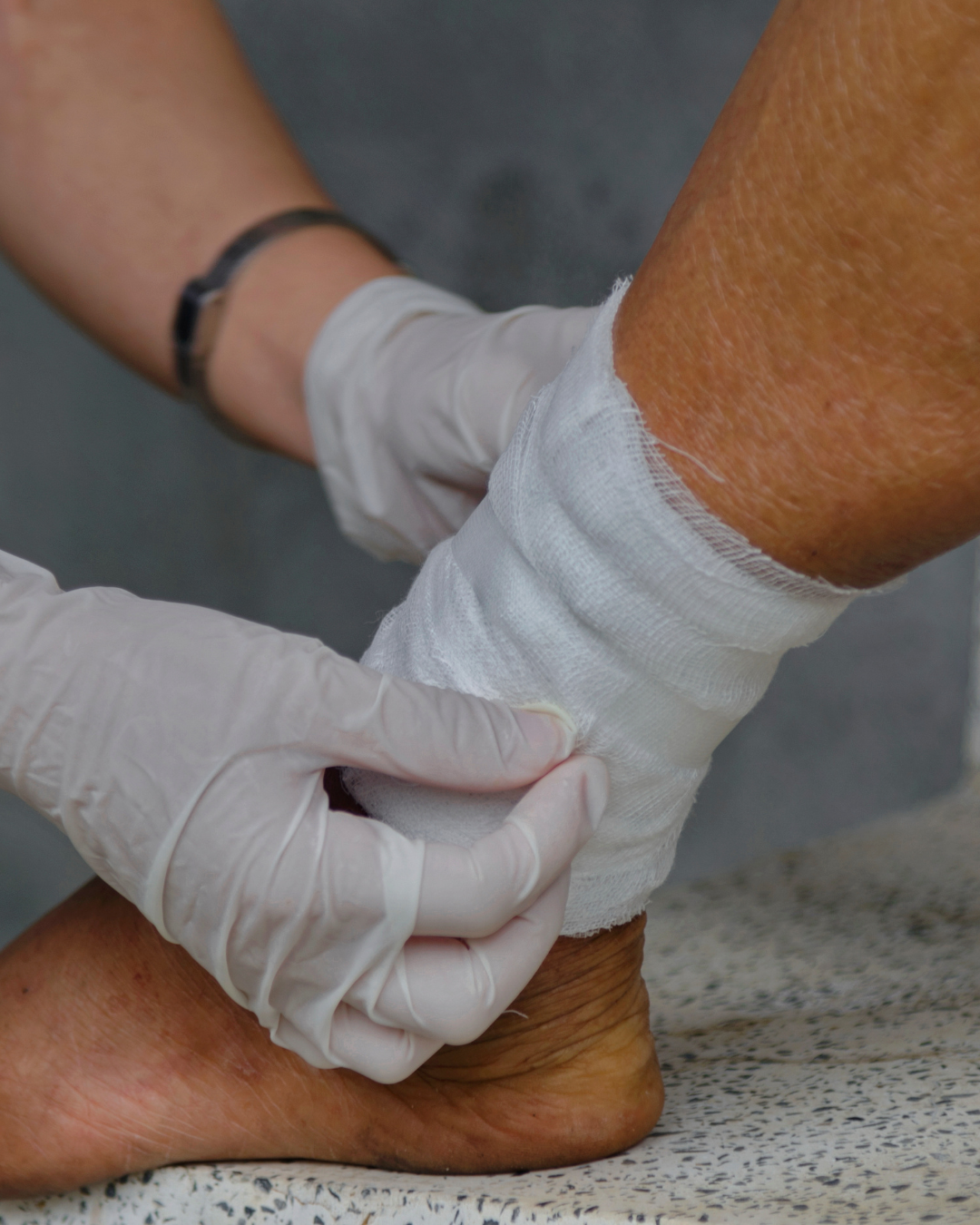Diabetic Wound Care Specialist
Diabetic Wound Care with Anodyne Pain and Health Group
Diabetic wounds, particularly those on the lower extremities, like the feet, are a serious complication of diabetes. They are caused by a combination of factors associated with diabetes, including:
Poor Circulation: Diabetes can lead to poor blood flow, especially in the extremities. This poor circulation can slow down the healing process of wounds.
Neuropathy: Diabetes often causes nerve damage (neuropathy), which can result in a loss of sensation in the feet. This means that cuts, sores, or blisters may not be noticed immediately, leading to a greater risk of infection and complications.
High Blood Sugar Levels: Elevated glucose levels can interfere with the body’s natural healing process and reduce the immune system’s effectiveness, making it harder for the body to heal wounds.
Infection Risk: Diabetic wounds are more susceptible to infection. Due to the impaired immune response and slower healing, even a minor wound can quickly become a serious problem.
Diabetic wounds require careful monitoring and management to prevent serious complications like infections or ulcers. They are often treated with a combination of methods, including keeping the wound clean and dry, using appropriate wound dressings, managing blood sugar levels, and sometimes medications or surgery. In severe cases, if an infection becomes too severe and is not responding to treatment, it may lead to the need for amputation.
Prevention is key in managing diabetic wounds. This includes regular foot inspections, proper foot hygiene, wearing appropriate footwear, controlling blood sugar levels, and regular check-ups with a healthcare provider.

Do I Need Diabetic Wound Care?
Knowing when you need diabetic wound care involves being vigilant about any wounds you have and understanding the specific risks associated with diabetes. Here are some key signs and situations that indicate the need for specialized diabetic wound care:
Slow Healing Wounds: If you have a cut, scrape, or sore that is not healing as quickly as expected, it’s a sign that you might need diabetic wound care. Diabetes can slow down the healing process, making even small wounds a concern.
Signs of Infection: Redness, warmth, swelling, or pus around a wound are signs of infection. Diabetics are more prone to infections, and these can escalate quickly, requiring immediate attention.
Foot Wounds: Any wounds on the feet, especially if you are diabetic, should be taken seriously. Due to nerve damage (neuropathy) and poor circulation, common in diabetes, foot wounds can go unnoticed and worsen.
Changes in Skin Color or Temperature: Changes in the color or temperature of the skin around a wound can indicate circulation problems, a concern for individuals with diabetes.
Numbness or Tingling: Diabetics often experience neuropathy, which can cause numbness or tingling. This means you might not feel a wound, so it’s important to visually inspect your feet and other areas prone to unnoticed injuries.
Persistent Pain: If you have a consistently painful wound, it’s a sign that it is not healing properly and may need specialized care.
Presence of Calluses or Corns: These might indicate abnormal pressure points on your feet and can lead to ulcers or sores if not properly managed.
Change in the Size or Depth of the Wound: If a wound gets larger or deeper, it’s a clear sign that it’s not healing and needs professional attention.
If you notice any of these signs, it’s important to seek medical advice promptly. Diabetics should have regular check-ups with their healthcare provider to monitor their overall health, and any wounds should be discussed during these visits. Early intervention and specialized wound care can prevent complications and promote better healing in diabetics.
Our Services
At Anodyne Pain & Health Group, our approach is not just about treating wounds; it’s about enhancing your overall quality of life. Our comprehensive care includes testing for infection, meticulous wound cleaning and disinfecting, applying suitable dressings, and ensuring optimal circulation to aid healing. We understand the complexities of managing pain and implementing strategies for the best healing outcomes.
In prolonged chronic wound care cases, we prioritize changing dressings regularly to prevent infection and promote faster recovery. We offer Advanced Wound Care solutions utilizing the latest skin graft technology in cases where the wound is not responding to conservative care. Our team is dedicated to preventing infection, educating our patients, healing the wound, and empowering you to take an active role in your treatment. Understanding the best wound care practices is crucial for effective healing.
At Anodyne Pain & Health Group, your treatment is tailored to your unique needs. Our experienced team assesses your wound’s specific type and severity and any underlying conditions that could impact healing or increase infection risks. Trust us to provide the care you need for a healthier, more comfortable recovery.

The Benefits of Diabetic Wound Care With Anodyne Pain and Health Group
Regular wound care for diabetic wounds offers several important benefits:
Prevention of Infections: Diabetic wounds are more susceptible to infection due to reduced immunity and blood flow issues common in diabetics. Regular wound care helps keep the wound clean and free from infectious agents.
Faster Healing: Regular care can speed up the healing process. Diabetics often have slower healing rates, and proper wound care ensures the wound environment is conducive to healing.
Monitoring for Complications: Regular wound care allows for ongoing monitoring. This means any complications like worsening infections, necrosis, or other issues can be detected and treated early.
Reduction in Risk of Ulcers and Amputations: Diabetic wounds, especially foot ulcers, can lead to severe complications like gangrene, which may necessitate amputation. Regular care reduces the risk of such outcomes.
Improved Quality of Life: By managing and healing wounds effectively, patients can maintain a better quality of life, with less pain and fewer mobility issues.
Education and Self-Care: Regular visits to a healthcare provider for wound care also provide patient education about diabetes and wound management, which can lead to better self-care practices.
Management of Chronic Conditions: Diabetic wounds can indicate underlying issues like poor blood sugar control or vascular disease. Regular wound care sessions can help in the overall management of these conditions.
Psychological Benefits: Managing wounds effectively can also have psychological benefits, reducing stress and anxiety that often come with chronic wound management.
Individuals with diabetes need to seek prompt and regular medical attention for any wounds, given the increased risks and complications associated with diabetes.
Don’t let diabetic wounds compromise your health and quality of life. With Anodyne Pain and Health Group, you have a partner in managing and healing your diabetic wounds. Our specialized care focuses on preventing infections, accelerating healing, and ensuring your comfort and well-being. We serve patients from Katy, TX, Rockwall, TX, Las Vegas, NV, and Marietta, GA.